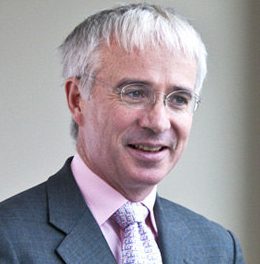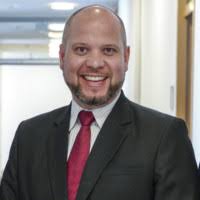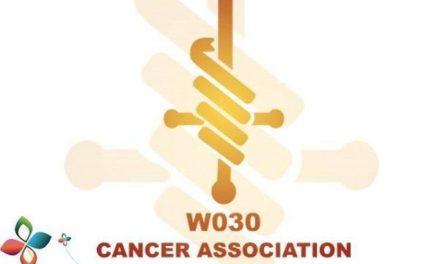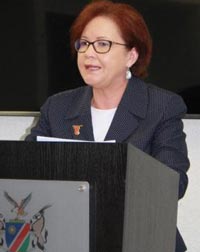
Debmarine, UNAM launch COVID-19 testing lab
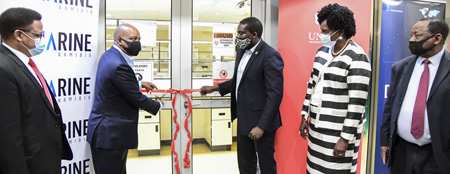
Diamond recovery giant Debmarine Namibia and the University of Namibia recently joined forces and established a laboratory that is licensed to conduct COVID-19 tests as local transmission cases pile up. The official hand-over of the equipment took place on Tuesday at the UNAM School of Medicine.
Debmarine Namibia acquired a COVID-19 PCR testing laboratory and signed a Memorandum of Agreement (MOA) with the University of Namibia (UNAM), School of Medicine to conduct tests.
The sponsorship will support government efforts in the national fight against the COVID-19 pandemic. Additionally, this sponsorship supports the Company’s internal focus on protecting and testing its employees as well.
UNAM’s rich profile of science and medicine experts will run the facility for a period of around one year, after which the ownership of the equipment will be ceded to the university.
The PCR machine valued at more than N$3.6 million will play a vital role in the turnaround time for results as it is expected to analyse at least 250 samples per 8 hours shift.
The establishment of the testing laboratory at UNAM’s Hage Geingob Campus will increase the diagnostic and prognostic testing process of COVID-19 and complement efforts by the Namibia Institute of Pathology (NIP) and accelerate the country’s testing capacity. NIP helped UNAM acquire the license by guiding them through the strict licensing process.
Debmarine Namibia CEO Otto Shikongo committed the company to doing everything it can to protect its employees and the surrounding communities.
“We value the health and safety of our people above all else and are equally committed to delivering
support to our country throughout this difficult period. Our aim is to keep our operations running, safely, and to proactively support and supplement efforts of the government”, remarked Shikongo.
“This great contribution by Debmarine Namibia will offer UNAM medical students real time clinical opportunities that will benefit the country’s only locally trained medical doctors phenomenally,” said UNAM Vice Chancellor, Professor Kenneth Matengu.
The PCR machine came with a fully equipped laboratory equipment such as fridges, freeze samples, cabinets with ultra-violet to prep the specimens and centrifuge machines and so forth.
For the past two weeks, the new PCR machine underwent stringent Government and World Health Organisation validation processes. “The UNAM laboratory team responsible for operating the testing machine have been trained by experts to increase local capacity”, remarked Debmarine Namibia Strategic Project Portfolio Manager, Danie van Aswegen. He added that the company tried its level best to make sure that the laboratory is fully equipped and ready.
The acquisition of the PCR machine is an extra precautionary measure by Debmarine Namibia to protect its employees and minimise the risk of the virus spreading into the business. The availability of the testing machine will enable the company to test employees before they go to the vessel as well as the shorebased employees said Debmarine Namibia Senior Human Resources Manager André Liebenberg. He said two-thirds of their companies’ employees are sea-going and the acquisition of the PCR machine adds a further layer to the robust precautionary measures the company already has in place. “This testing will shorten quarantine period for our employees”.
The machine was acquired through leveraging the global supply chain and procurement capability of De Beers via Aglo American Plc.
Minister of Health and Social Services Dr Kalumbi Shangula, Minister of Higher Education Training Dr Itah Kandjii-Murangi, Acting Chief Executive Officer of Namibia Institute of Pathology (NIP) Dr David Uirab witnessed the hand-over.
Caption: (from l-r): NIP Acting CEO Dr David Uirab, Debmarine Namibia CEO Otto Shikongo, Vice-Chancellor of the University of Namibia Proff. Kenneth Matengu, Minister of Higher Education Technology and Innovation Honorable Dr. Itah Kandjii-Murangi, Minister of Health and Social Serives Dr Kalumbi Shangula.
























